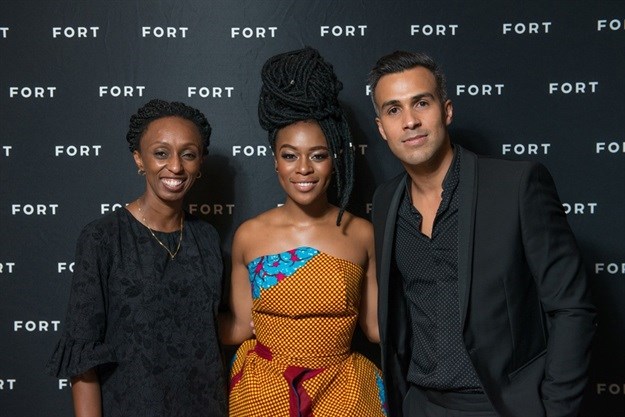
Fort was founded in 2006 as a creative, brand and content agency under the mantra ‘storytellers for a connected world’. Its founders were best friends – and UCT students at the time – Shukri Toefy (a Law and Business student) and Amr Singh (who studied Media Studies, Anthropology and Film Production). From early beginnings where client pitches were drafted during train trips between studies, the pair has grown the agency vastly over the last decade, opening head offices in Johannesburg and recently expanding to Nairobi with an additional branch in Lagos due to open in the second half of the year. And more to come.
The goal with this expansion is to position Fort as an African brand which becomes a global brand, furthering a cohesive transcontinental narrative of creative excellence. “We’ve done work in over 17 African countries and in a large part, the expansions are just a consolidation and an affirmation of partnerships which already exist,” Shukri Toefy explains. “Now we’re saying, ‘Hey, let’s partner together and be stronger together. Join Fort and we can push work to you, where South African and international brands require advertising or content across the continent.’ We’re trying to be an example of a company that takes a leadership position within the independently-owned African creative economy.”
Recently celebrating their 10th anniversary as an agency, Fort formalised their commitment to this vision through an initiative entitled the #CreateMovement campaign. Announced at a star-studded affair at The Venue in Melrose Arch, Johannesburg in the beginning of February, #CreateMovement is aimed at building an African narrative in the creative economy; a term Toefy uses to refer to creative industries such as entertainment, advertising, communications, art, fashion, and music. More than just a celebration, the launch provided an opportunity to lay out the agency’s radical plans moving forward and culminated in a campaign video which was democratically filmed on the night and accompanied by a specially commissioned track performed by Myles Malone feat. Manyora.

“There are pockets of excellence everywhere, doing great things that we would call ‘proudly African’ who are driving and owning that narrative,” elaborates Toefy on the aims of the campaign, “That’s what we want to create movement towards and try to rally people behind. The chance that most major corporations in South Africa are using a foreign-owned company to do their marketing communications and storytelling is probably 60-70%. Our money flows off-shore and our narratives are dictated by these foreign-owned companies.”
Toefy is quick to stress that “#CreateMovement is not a crusade against foreign direct investment into our creative economy at all, there is obviously a lot of value which they bring.” That being said, he firmly believes that there should be a consciousness and a conversation around where money flows in the industry. “How do we take hold of our own narrative? The stigma that says that foreign-owned advertising agencies are the only ones worthy of respect is as much of an antiquated relic of where we’ve come from as a statue of Cecil John Rhodes.”
This is where the idea of categorising #CreateMovement as a decolonising enterprise emerges. Over the past two years, both Toefy and Singh have followed the events at their alma mater closely, and admit to feeling emotional around the fact that people have been driven to protest due to the seeming insurmountability of student fees. “When I was an idealistic humanities and politics and law student at UCT, I wrote many essays about neo-colonialism and Kwame Nkrumah and Julius Nyerere, talking about how development has to come from within,” recalls Toefy. The part of the #feesmustfall movement which really resonated strongly was the idea of decolonising as a challenging of privileged narratives. “I realised that the creative economy within which we work, could do with some decolonising as well.”
“The idea of decolonising can be a very loaded term, so Amr and I were thinking deeply about why it hadn’t occurred to us to break down the statue of Rhodes while we were writing these essays. When we were two young students who needed to pay back their student loans, we became entrepreneurial activists in a sense because of that.” Toefy and Singh are cognizant of the fact that the problems highlighted by the student movements are not confined to tertiary education. “Your challenge is not only to pay back your student fees but also to try to find a job and find a place in this economy. Fees are not your biggest problem in this world,” he reasons. “We were those guys with NSFAS loans, jumping on the train and being activists by saying, ‘Our role is to create employment for 50 people’ and the corresponding waterfall effect of what that means down the line. So we’re retroactively labelling it as entrepreneurial activism, but that was how we chose to respond to those problems.
“For me, a large part of the activism that will create more peace in the world, is if we can understand how we can democratise our economy and allow people to be the master of their own destiny. If someone ever asked me for one word which is key to leadership and my life, it’s empathy. I know what it’s like to not have the things we’ve gained, because I used to be in the same position. And I’m committed to trying to spread that as much as possible. When one of our employees previously took the train and now owns a car, that’s actual change.”
This is the same ethos which underlies Fort’s new shared prosperity model which forms a key part of #CreateMovement. In it, 10% of the company is donated to staff via an employee fund. “We need to think about the idea of a company completely differently,” Toefy reflects. “In developing economies it’s even more important to think about how you grow the teams behind your creative industries. The idea that only the shareholders should make money is archaic. You’re putting the best years of your life into working for a company, why should the owners be the only people to reap the rewards from that?”
The shared prosperity model was announced at the #CreateMovement campaign launch, alongside a new sustainability arm of the company dubbed Hold the Fort, which will comprise a further percentage of the company. While grandstanding at a swanky launch event is all well and good, the measure of an initiative comes down to whether it can deliver on its promise, a process which Toefy describes as unglamorous. “It’s fine to stand on stage and lay down the vision,” he observes, “but then the actual work associated with achieving that goal is a hard slog: it’s contracts, and it’s lawyers, and it’s systematising, and it’s productising what we do and thinking about how we create financial models to make this work.”
“I firmly believe that it’s the economics which drive socio-political change. Apartheid actually ended when there was a sustained period of economic embargoes on South Africa; eventually it didn’t make economic sense for the Apartheid government to carry on. And there are obviously examples of that sort of thing all over the world. In our present context, I disagree with political organisations who suggest that we necessarily need to nationalise everything, but I do agree that young people need a fight. And the fight lies in the economy of South Africa. And for us, that is where entrepreneurial activism needs to be directed. Our plan of action is to set the example internally within our company that says ‘You can be African, independent and black and be world class.' Those are the themes that we want other companies to be inspired by and step up.”
More information about Fort and #CreateMovement can be found at fort.co.
